Hot Wing King
Studio Theatre
Jordan Wright
July 6, 2022
Special to The Zebra
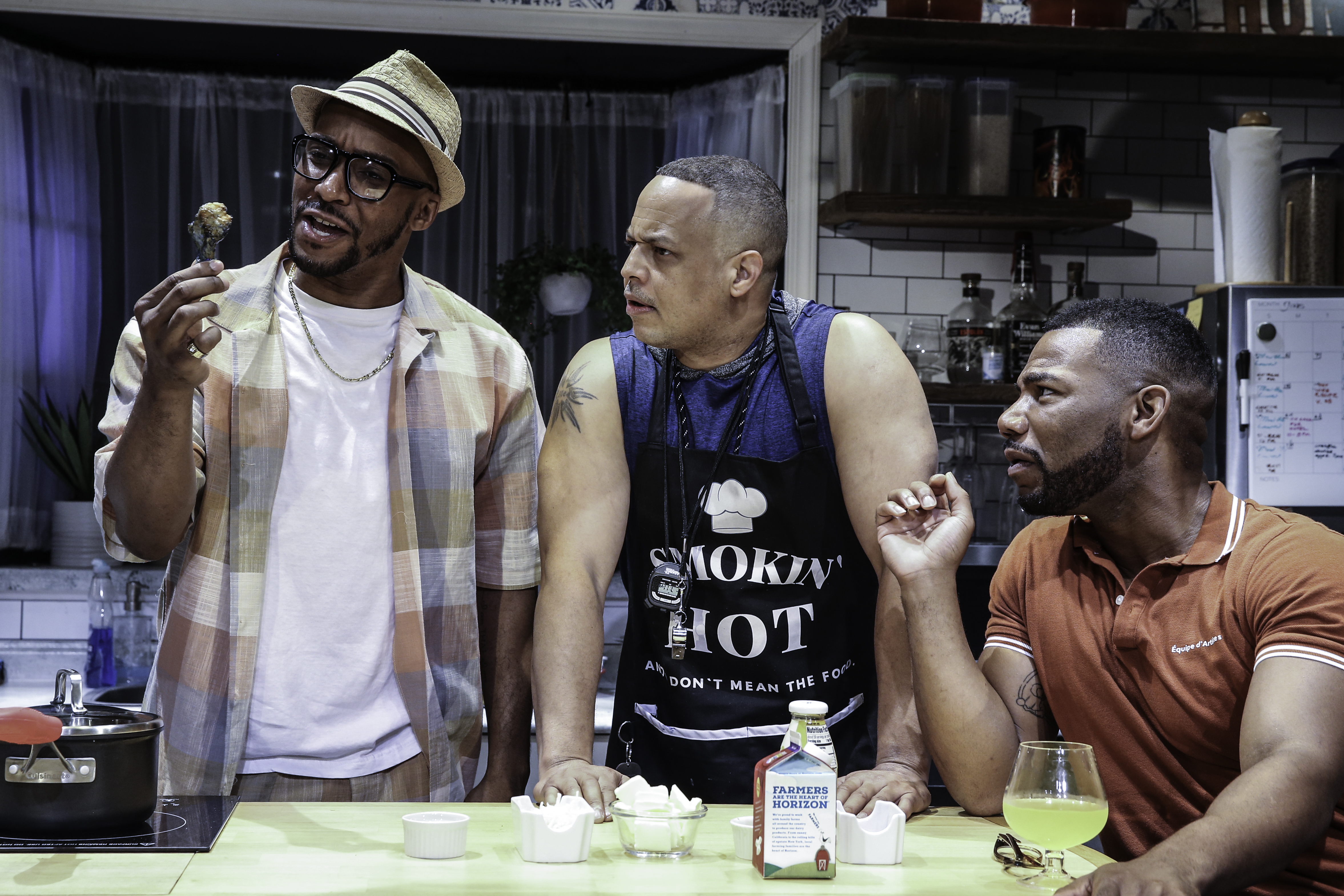 Bjorn DuPaty, Brian Marable, and Blake Morris (Photo/Jati Lindsay) At the top of her game, Pulitzer prize-winner and Tony nominee, Katori Hall, has written a staged sit-com about five roommates entering the Hot Wing Festival contest in Memphis. All five men are African American gays living in the same house. And although their personalities are very different, their aim to win the $5,000 top prize with Cordell’s tried and tested Blueberry- and Bourbon-infused Cajun Alfredo Wings with Blue Cheese and Crumbled Bacon Wings keeps the men in collective disharmony.
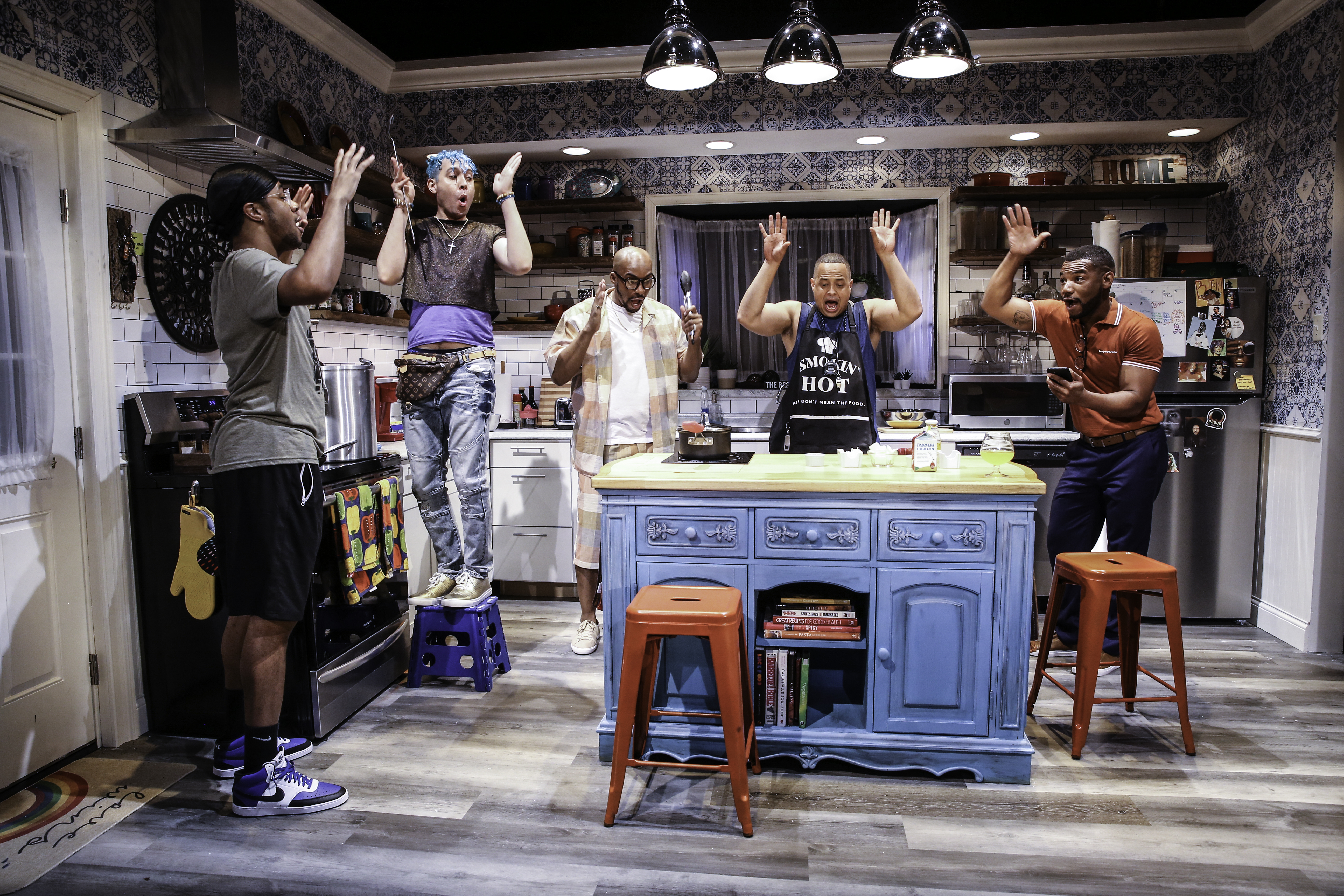 Derrick Sanders III, Michael Kevin Darnall, Bjorn DuPaty, Brian Marable, and Blake Morris (Photo: Jati Lindsay) The group, calling themselves “The New Wing Order”, gather in the kitchen the night before to prepare for the contest. Isom (Michael Kevin Darnall) is the reigning queen of the quintet alternately flinging barbs and hugging his roomies. As a New Orleans self-proclaimed Cajun expert, he is a bit of a lost soul who covers it up with his flagrant flightiness. To his erstwhile lover, a local barber they call Big Charles (Bjorn DuPaty), he sadly admits, “People only want me for one night.”
In the process of making 387 wings for the next day’s big contest, the drama ensues. Will Cordell (Brian Marable) defeat his inner demons? Will his faithful lover, the fashion-conscious Dwayne (Blake Morris) keep their relationship alive? Will TJ (JaBen Early), the streetwise dope dealer, lead his innocent son EJ (Derrick Sanders III) into a life of crime? EJ is Dwayne’s nephew and he’s got a stake in the decision to keep EJ out of trouble.
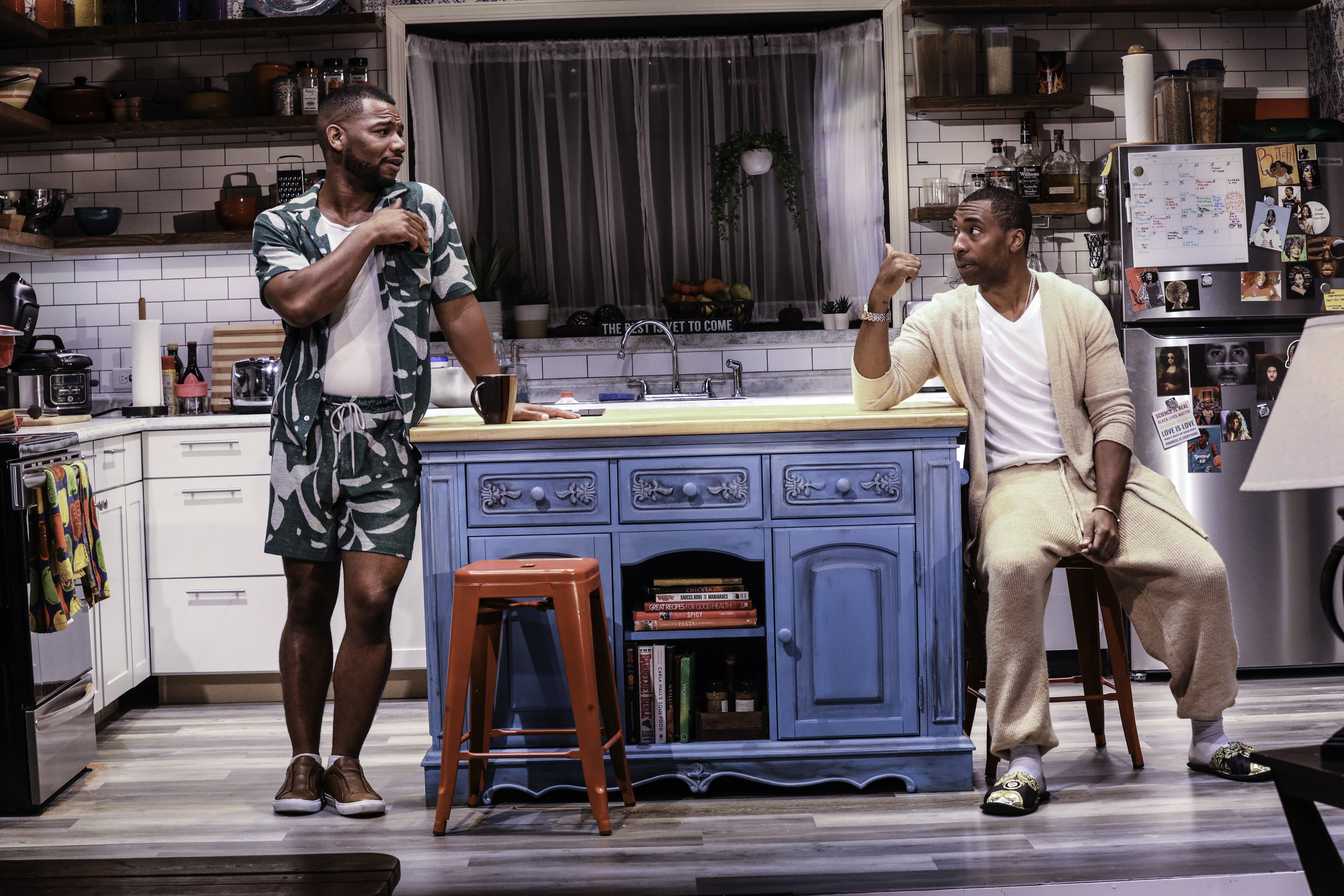 Blake Morris and JaBen Early in (Photo/Jati Lindsay) Within this serio-silly comedy peppered with verbal jousting, there is an emotional backstory as the men alternately cast blame on one another for their failings, then manage to work together to resolve their differences.
Sprung out of a conversation Hall had with director Steve H. Broadnax III about her brother and his partner, living in Memphis, Broadnax told her, “That’s your next play!” For Hall it’s a love letter to the complexities of a gay, stitched-together family living in the heart of the American South.
 Perfecting their wing recipe: (l to r) Derrick Sanders III, Blake Morris, Brian Marable, Bjorn DuPaty, and Michael Kevin Darnall. (Photo: Jati Lindsay) Dramaturg Adrien-Alice Hansel; Costumes designed by Ivania Stack; Lighting designed by Alan C. Edwards; Props by Amy Kellett; Dialect Coach Caroline Stefanie Clay; and Intimacy Choreographer Raja Benz.
Through July 31st in the new Victor Shargai Theatre stage at Studio Theatre, 1501 14th Street, NW, Washington, DC 20005. For tickets and information visit www.StudioTheatre.org or call the box office at 202 332-3300. Parking is tricky in this busy neighborhood. If you are coming after 5pm, park at the Washington Plaza Hotel a few blocks away and be sure to pay for your $13 discount voucher at the Box Office before leaving the theatre.
John Proctor is the Villain
Studio Theatre
Jordan Wright
May 5, 2022
Special to TheZebra.org
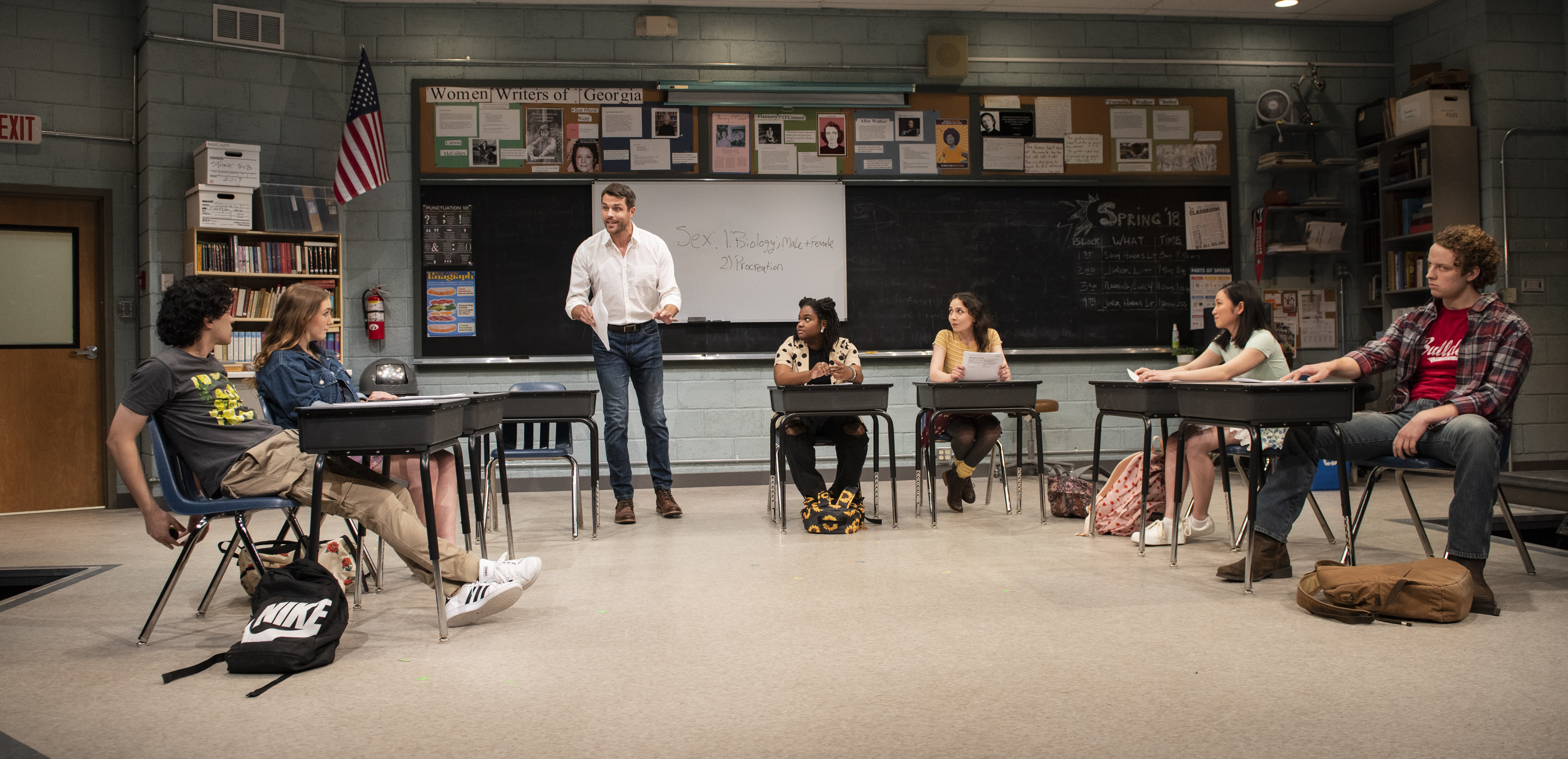 Mr. Smith’s classroom. Dave Register (center, standing) leads a lesson for students at Helen County High. Photo: Margot Schulman. Drawing on Arthur Miller’s iconic American play, “The Crucible”, Playwright Kimberly Belflower returns to her Appalachian roots to reimagine this classic through the lens of teenagers trying to navigate the angsty world of Helen County High. Plenty of drama there. In the process these classmates are revealed as superficial, funny, vulnerable, sometimes unkind, yet loyal, and questioning, always questioning. Belflower’s intent is to reveal how fragile and easily influenced these young minds are and how telling truth to power can have serious consequences. Her story sees parallels in the #MeToo movement and the struggle between powerful males vis à vis powerless females.
Welcome to “Teen World”. Warning: If you don’t know who Lizzo, Beyoncé, Mos Def, Lourdes and Taylor Swift are, you might want to do a little googling to know what drives teenagers today. It’s far from sappy lyrics of love and loss. Today’s music speaks of romance, but also of self-empowerment.
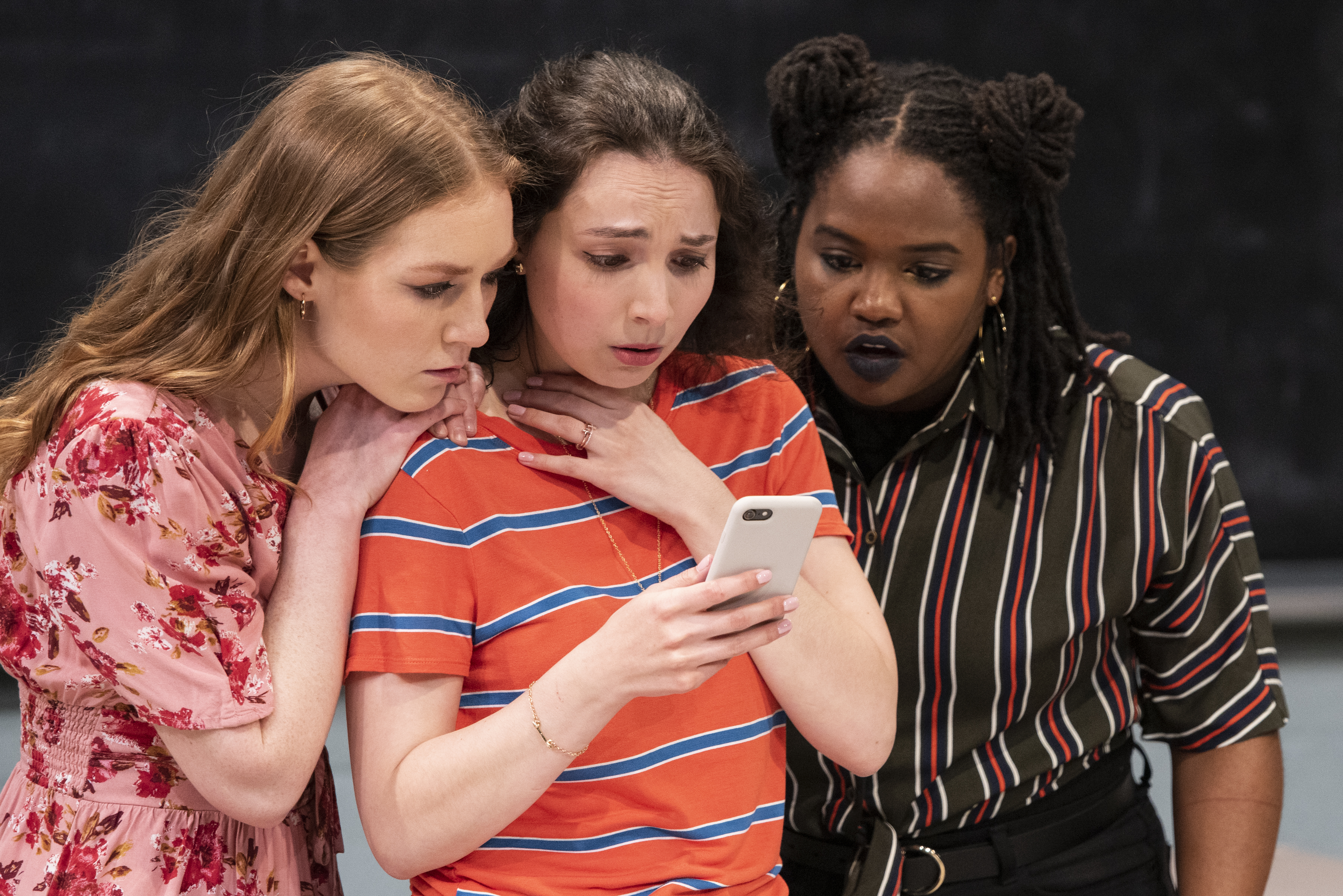 Jordan Slattery, Miranda Rizzolo, and Deidre Staples. Photo: Margot Schulman. These highschool girls want to embrace that sense of personal strength and form The Feminism Club, but they are told in no uncertain terms by school counselor Bailey Gallagher (Lida Maria Benson) that to get their club approved and avoid pushback from their provincial little town, they must include male classmates. One is Rae Lynn’s former boyfriend, Lee (Zachary Keller) who has cheated on her with her best friend Shelby (Juliana Sass), the other is Mason (Ignacio Diaz-Silverio). Rae Lynn (Jordan Slattery) is firm with Lee about not wanting to renew their relationship after he has breached her trust. When he manhandles her with a stolen kiss, she tells him it is sexual abuse. You go, girl!
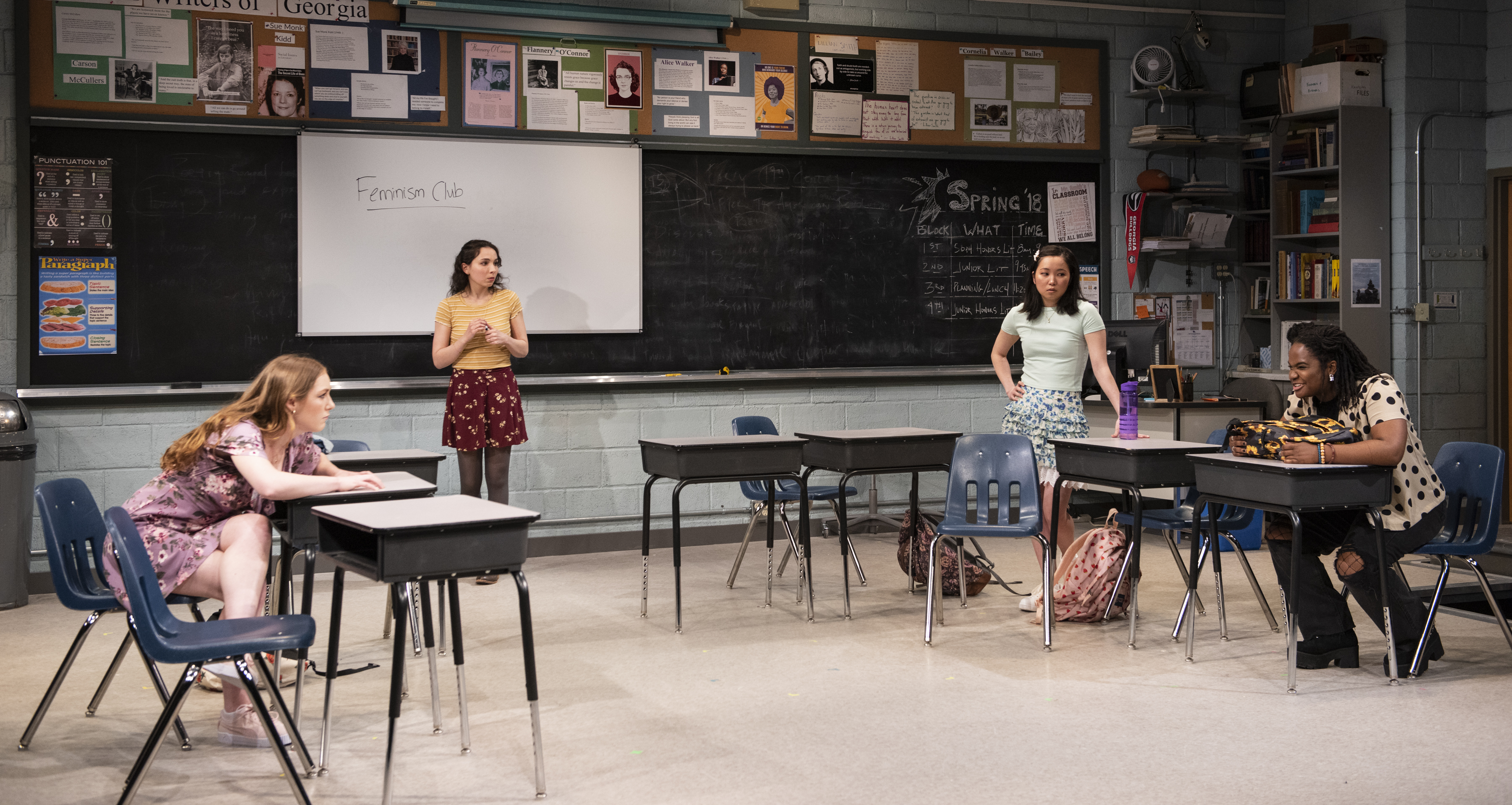 Students start a Feminism Club. Jordan Slattery, Beth Rizzolo, Deidre Staples, and Resa Mishina. Photo: Margot Schulman. Beth (Miranda Rizzolo) is the brainiac and teacher’s pet whose idea it is to start the club and they are super pumped when their Sex Ed teacher Carter Smith (Dave Register) agrees to be their sponsor. The girls find him dreamy and fantasize about what it would be like to have sex with him. They discuss the Purity Pledge, a concept involving a promise not to engage in sex before marriage. New girl Nell (Deirdre Staples) is the cool girl, watching dramas unfold among the clique and offering her not inconsiderable insight. “We teach girls to make themselves smaller” she tells them quoting a Beyoncé lyric. Amid all that insecurity it’s discovered young Ivy’s mother has been exposed as having an affair embarrassing Ivy (Resa Mishina) and forcing her to retreat in shame. Ultimately, the girls bond over Pop music and their stressful experiences with parents and boys. Pressure on these teens comes not only from with their need to be accepted among their peers, but from outside their group – from male adults who are equally as flawed yet in a position to take advantage of their weaknesses.
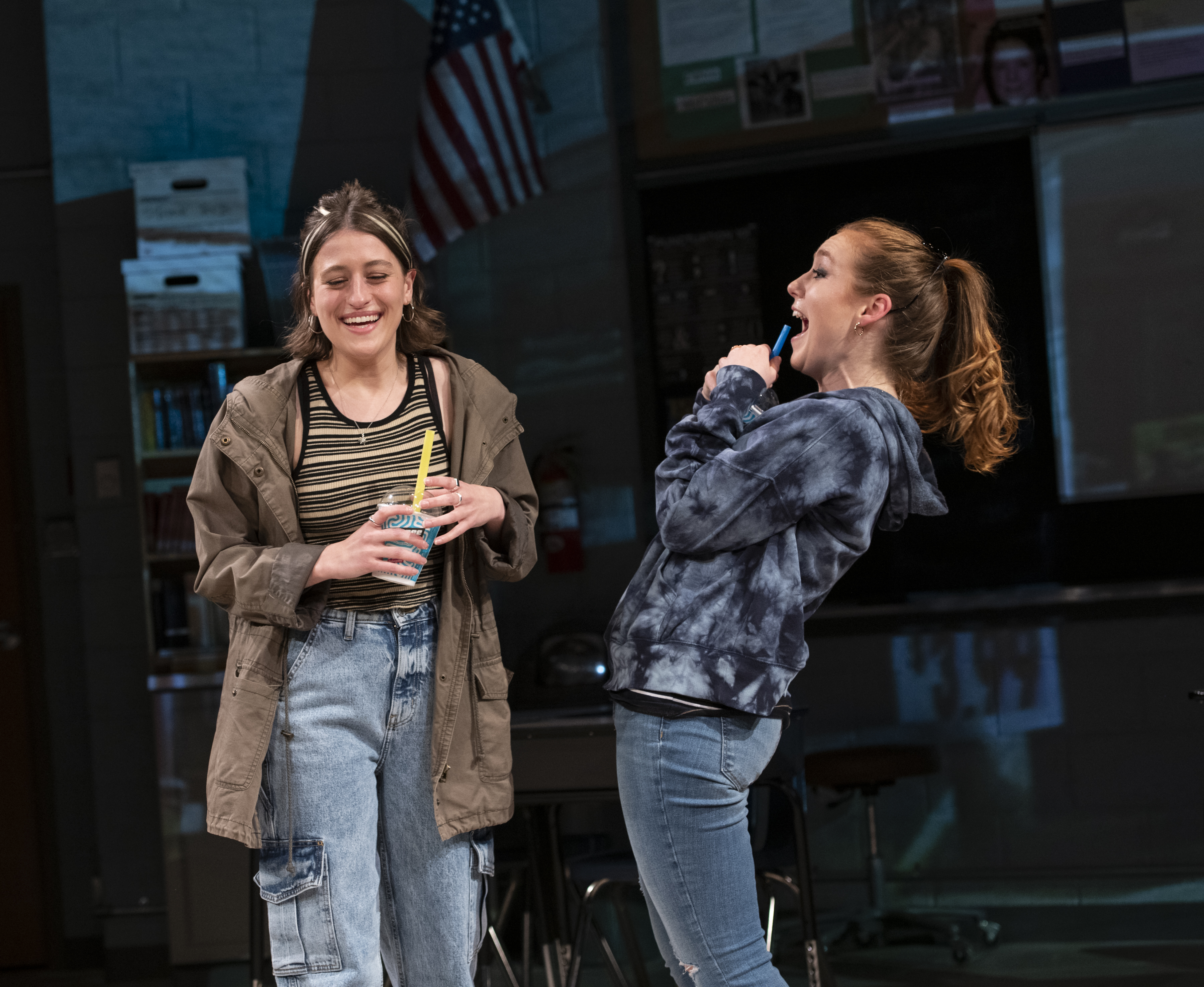 Juliana Sass and Jordan Slattery. Photo: Margot Schulman. Belflower sees their struggles as the perfect storm – one in which an adult can prey on the most vulnerable and where adults can lie and those lies can destroy a child forever. Her reinvention of The Crucible shows us how readily the term “witch hunt” can be used by powerful men to discredit their female accusers and how we still see this in modern society.
Thoughtfully directed by Marti Lyons who gets terrific, thoughtful and energetic performances out of this very young, very brave cast. With Set Design by Luciana Stecconi; Costume Design by Moyenda Kulemeka; Lighting Design by Jesse Belsky; Sound Design and Composer Kathy Ruvana; Intimacy and Fight Choreographer Chelsea Pace; Dramaturg Adrian-Alice Hansel.
Through June 5th at Studio Theatre in the Mead Theatre, 1501 14th Street, NW, Washington, DC 20005. For tickets and information visit www.StudioTheatre.org or call the box office at 202 332-3300. Be sure to check out the website for Covid protocols.
Jordan Wright
January 9, 2020
In Dominique Morisseau’s play Pipeline, a direct line is drawn from the consequences resulting from a broken school system to criminal punishment or expulsion for teenagers acting out. That the system is broken, and kids are warehoused in these ever-larger institutions with no remedies for psychological attention, is well known. But what are we doing about? Schools aren’t getting smaller, nor are classrooms, teachers are overwhelmed, and counselors are in short supply – one counselor per 482 students is the national average. That’s nearly half what is recommended by the National School Counselor Association to address the needs of kids in crisis. The play is an indictment of the current American school system.
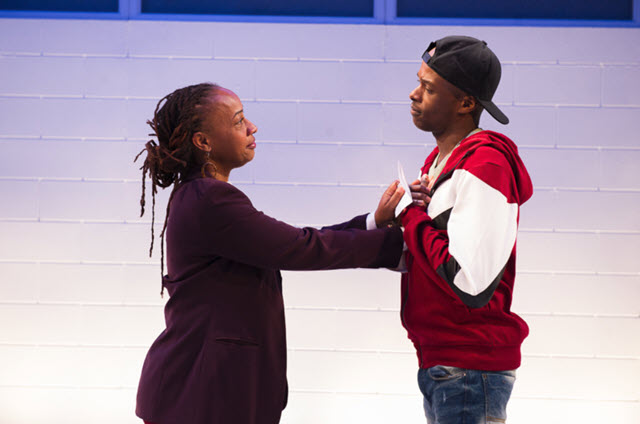 Andrea Harris Smith as Nya and Justin Weaks as Omari in Pipeline. Photo: C. Stanley Photography. Morisseau’s powerful play presents us with African-American teens in a private school vs. those in a public school. Given current laws and strict punishment guidelines to address punishment for students as well as teachers, the differences between the two types of schools in handling issues between teachers, students and parents, actually appear to be minimal. Though Omari’s mother, Nya, teaches in a public school, she and his distant father, Xavier, afford him the advantages of a private school, hoping he will have access to a better education. But Omari’s personal problems stem from outside the school – divorced parents and a complicated romance with Jasmine, a fellow student. They are smart kids. Nevertheless, as teens they are ruled by their emotions and insecurities, and their reactions are often wrong-headed and impulsive.
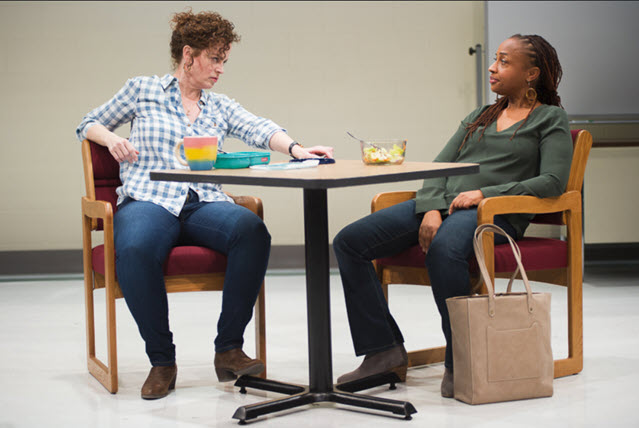 Pilar Witherspoon as Laurie and Andrea Harris Smith as Nya in Pipeline. Photo: C. Stanley Photography. Omari’s rage quickly gets the better of him when he is confronted by a teacher who expects his participation at a time when the teen is feeling vulnerable. His reckless response is to shove the teacher against the wall. Classmates record the incident with their cell phones and the incident goes viral. Does the teacher have a responsibility to deal with a troubled teen in an overcrowded classroom or intuit his personal crisis? Probably, not. But in consoling her child, Omari’s mother reminds him he is in school to learn and obey his teacher.
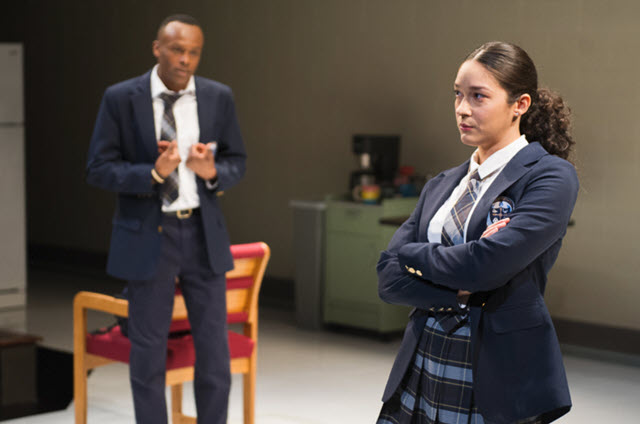 Justin Weaks as Omari and Monica Rae Summers Gonzalez as Jasmine in Pipeline. Photo: C. Stanley Photography Nya’s colleague and veteran teacher, Laurie, has struggles of her own. Unable to reach Dun, the school’s security guard, who’s off dealing with another crisis, she tries breaking up a vicious fight in her classroom with a broomstick. She too, becomes at risk of expulsion.
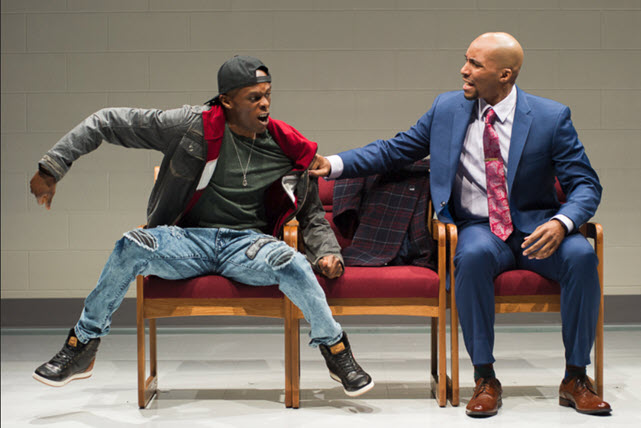 Justin Weaks as Omari and Bjorn DuPaty as Xavier in Pipeline. Photo: C. Stanley Photography The framework for the play draws on Richard Wright’s “Native Son” and the character Bigger Thomas who became a murderer due to his inability to control his rage. Additionally, video projections of Pulitzer Prize-winning poet Gwendolyn Brooks’s poem, “We Real Cool”, in which young African American students skip school to go down a deadly path, are displayed onto the stage walls in a haunting forewarning of a fate that all fear could become Omari’s.
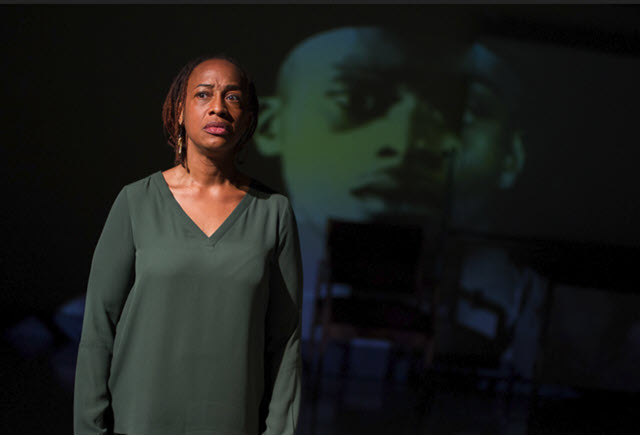 Andrea Harris Smith as Nya in Pipeline; background: live projection of Justin Weaks as Omari. Photo: C. Stanley Photography As a former high school teacher in DC, Artistic Director David Muse notes, “Maybe most striking and recognizable to me about Pipeline is Dominique’s [Morisseau’s] treatment of the fatalism that takes hold of urban educators and parents as they struggle daily to deal with systems that seemed stacked against the young people in their charge.”
A powerful and haunting drama performed by an excellent cast.
Starring Andrea Harris Smith as Nya; Justin Weaks as Omari; Monica Rae Summers Gonzalez as Jasmine; Bjorn DuPaty as Xavier; Pilar Witherspoon as Laurie; and Ro Boddie as Dun.
Directed by Awoye Timpo; Set Design by Arnulfo Maldonado; Lighting Design by Jesse Belsky; Sound Design by Fan Zhang; Projection Design by Alexandra Kelly Colburn; Dramaturg Lauren Halvorsen.
Through February 16th at Studio Theatre, 1501 14th Street, NW, Washington, DC. For tickets and information visit www.StudioTheatre.org or call 202.332.3300.
Jordan Wright
September 12, 2019
Doubt may be a parable, but it’s also a conundrum. Playwright, John Patrick Shanley, does his best to keep us guessing if an unspeakable act was committed against a 14-year old student of St. Nicholas parochial school by a priest, or if it simply never happened. Set in 1964 in the Bronx, New York, this moral drama leaves us in the dark as to who is the truth-teller, and who is stirring up trouble as a result of a vivid imagination. Sister Aloysius Beauvier is the hard-hearted administrator and iron-fisted overlord at the middle school. Plotting to accuse the priest, the aged nun tries to convince Sister James, a naïve novitiate that he is guilty. This takes some doing since Sister James caring approach towards her students is antithetical to Sister Aloysius’s suspicious mind.
 Sarah Marshall and Amelia Pedlow in Doubt: A Parable. Photo: Teresa Wood Suspecting Father Flynn has committed a sexual crime involving the school’s first and only African American student whom he has been mentoring, she cajoles Sister James into becoming her ally, convincing her that he is guilty of using his time with the boy to take advantage of him.
Shanley knows of what he writes as the setting and his experiences in a Catholic School inform his play. He refers to it as “… a pathway to his real subject: America’s collective resistance to uncertainty.” That manifestation of society’s doubt about certainty is evidenced in the play’s complex theme. Shades of the Catholic Church’s sex abuse scandals color the plot, and even the viewer struggles to detect truth from fiction – subterfuge from innocence.
 Christian Conn and Sarah Marshall in Doubt: A Parable. Photo: Teresa Wood The 1960’s was a difficult time for the Catholic Church. While nuns and priests were leaving in droves, the Church aimed to right itself by declaring a kinder, more liberal approach to both its teachings and its services. Yet, in this seesaw of emotions and intense pressure to change, Shanley aims to throw us back on our heels with the accusations hurled against Father Flynn, keeping us in the dark as to who is being truthful and who might be bent on the destruction of three lives – the boy, Flynn and Sister James. “The most innocent acts can seem sinister to a poisoned mind,” Father Flynn warns Sister Aloysius.
Scenes toggle between Father Flynn’s sermons to the congregants, mirroring in metaphors his ongoing crisis with Sister Aloysius, and provocative confrontations in her office where she eventually interviews the boy’s mother, Mrs. Muller, played memorably by Tiffany M. Thompson. Of particular note is Flynn’s sermon on the parable of feathers whose wind-borne dispersal is likened to the dangerous spreading of vicious gossip.
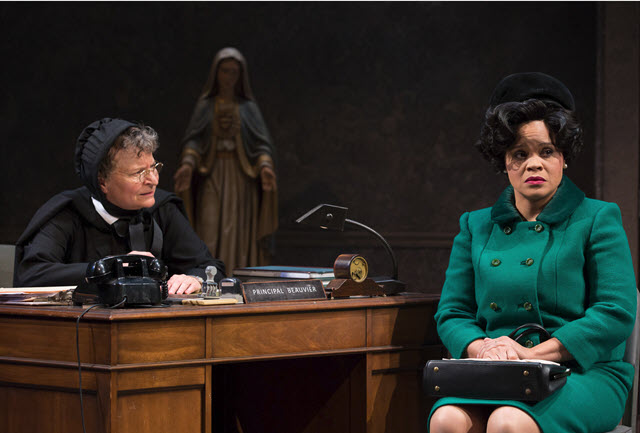 Sarah Marshall and Tiffany M. Thompson in Doubt: A Parable. Photo: Teresa Wood. As an audience we hope that Flynn’s kindness and Sister James’ support win out. Yet, Shanley forces us to wonder if the old curmudgeon could be onto something. Don’t expect to come away with an easy or satisfying resolution. The surprise ending will have you reevaluating everything you thought you knew about the truth.
 Sarah Marshall and Christian Conn in Doubt: A Parable. Photo: Teresa Wood. Starring Sarah Marshall as Sister Aloysius Beauvier, Christian Conn as Father Brendan Flynn and Amelia Pedlow as Sister James.
Directed by Matt Torney with Set Design by Daniel Conway, Costume Design by Wade Laboissonniere, Lighting Design by Dawn Chiang, and Sound Design by Victoria Deiorio.
Through October 6th at Studio Theatre, 1501 14th Street, Washington, DC 20005. For tickets and information visit www.StudioTheatre.org or call 202.232.3300.
Jordan Wright
June 24, 2019
Studio Theater’s new Milton Theatre is looking to attract a summer crowd and last night it did. Called SHOWROOM it is a casual space offering specialty cocktails and snacks at the bar. Olney Theatre Center’s production of Every Brilliant Thing, by playwrights Duncan MacMillan and Jonny Donahoe, is a one-man, one-act play about suicide and was the first of the off-beat performances of the season. Pleasantly ensconced at café tables lit with candles, the youngish crowd had bought their drinks and looked ready for a Friday date night that promised audience participation. Touted as a comedy, it seemed as though fun was just around the corner.
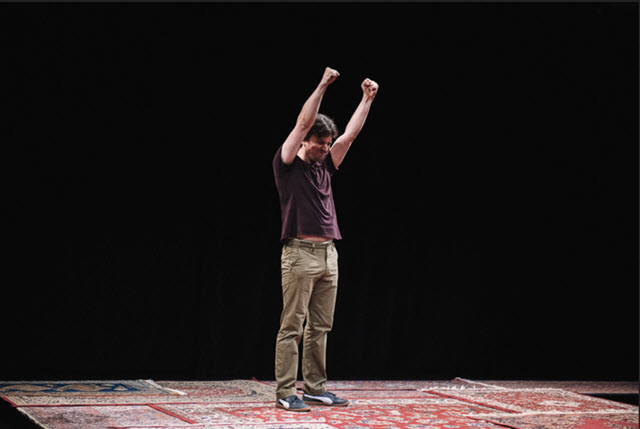 Alexander Strain and an audience member in Every Brilliant Thing. Photo: Teddy Wolff. So, maybe I should have had what they were drinking, or snagged one of the cards that was handed out in advance to a smattering of guests so they could call out some of the “brilliant things” Alexander was grateful for while his mother lay in hospital after another suicide attempt. But for me, no amount of jokes or self-deprecating comedic schtick could subtract from the fact that a family was being torn asunder by a mother’s crushing depression and nothing could stop that fateful train from jumping the tracks.
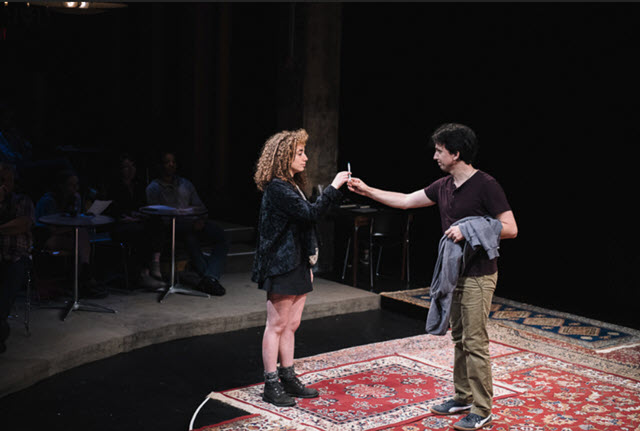 Alexander Strain and an audience member in Every Brilliant Thing. Photo: Teddy Wolff. Thinking about my feelings for the play, I drifted off to sleep that night and had a dream about it – a dream as quirky as the play itself. I dreamed that Amy Schumer was in a play she had written and was eager to get a group of us into the theater to see it. She described it as a story about her mother’s suicide. We didn’t want to see her act out her personal tragedy, but she begged us to participate. We entered the theater (in Greece, no less) and the more we listened, the more we wanted her to stop. Because though it seemed to be alleviating her sorrow, we couldn’t bear to hear the whole dismal story.
 The audience and Alexander Strain in Every Brilliant Thing. Photo: Teddy Wolff. That’s what this play is about more or less, except that the audience is conscripted to shout out these brilliant things like “ice cream”, “staying up past bedtime”, “things with stripes”, etc. Much of the time these non-actors couldn’t be heard across the room. My seatmate turned to me on several occasions with a quizzical look, as if hoping I would tell him. That left us wondering what the brilliant thing was that Alexander as the child, who later presents as a teenager, and ultimately a college student with his own crushing depression, might have said.
I’ll grant you it might seem like a healthy psychological exercise to look for the sunny side of life while everything around you is crumbling, but nonetheless, it doesn’t work out in the end for Alexander, even though a woman from the audience has been asked to play his dying dog’s vet, another has been asked to play his guidance counselor, and a man is challenged to play Alexander’s father, a man so removed from his child’s life, he closets himself away when the going gets tough.
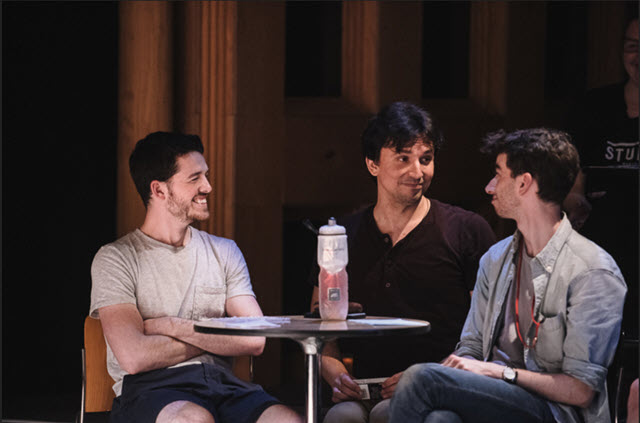 Audience members and Alexander Strain in Every Brilliant Thing. Photo: Teddy Wolff. Once in college Alexander learns of Goethe’s notions about suicide and subs an audience member to play the part of his college professor. He references ‘social contagions’ and agrees with the notion that we are unconsciously affected by the behavior of our peers – as in copycat suicides. It’s called the ‘Werther Effect’ after Goethe’s notable character. As Alexander tells us, “Children of depressed mothers have a heightened sense of stress.” It would be good to keep this warning in mind when writing a play about suicide.
The evening’s oddest moment came when a pretty girl who was asked to pretend she was Alexander’s girlfriend didn’t understand how the game was played. Everyone else in the audience had understood they were to parrot the words he voiced aloud to them but even after he repeatedly fed her the lines, she opted to concoct her own responses until she finally had that aha moment and played along. LOL… or not.
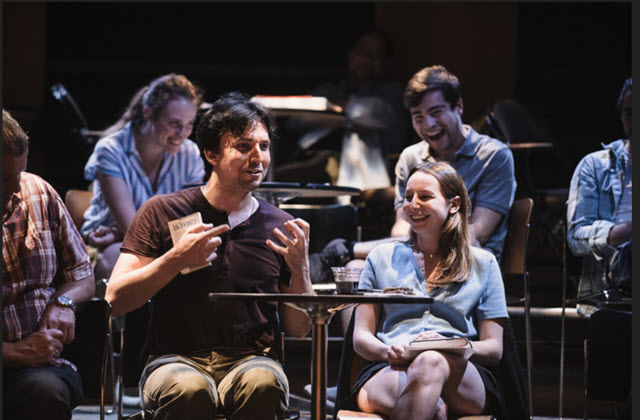 Alexander Strain and an audience member in Every Brilliant Thing. Photo: Teddy Wolff. So, see it if you’ve never known anyone who has committed suicide. That’s my warning. Just be sure to order a cocktail first. Who knows? You might find it amusing.
Directed by Jason Loewith and starring Alexander Strain.
Through July 7th at Studio Theatre – 1501 14th Street, NW, Washington, DC 20005. For tickets and information about the remaining shows in the run, visit www.StudioTheatre.org or call 202 232.7267
Jordan Wright
April 9, 2019
We all want to “stay woke”. Right? To be up on the issues of racial injustice and political correctness we need to keep current and stand up when it’s called for. For Dorian Belle, a Canadian pop star with a huge, fan-based, reality TV show, it’s more than that. He wants to stay woke while being black and get in on the black music scene. Unfortunately for Dorian, he’s white. Think Eminem and other white hip-hop celebs who have appropriated black culture in both music and style. It goes much further back than that with blackface, Elvis, the Rolling Stones and musicians who adopted (or outright stole) black music genres as their own. In truth, it’s complicated and that debate is the undercurrent of playwright Tearrance Arvelle Chisholm’s Pygmalion-inspired play.
 Gary L. Perkins III, Simon Kiser, and Seth Hill in P.Y.G. or the Mis-Edumacation of Dorian Belle. Photo: C. Stanley Photography Dorian believes that taking on more of a black identity, would add to his street cred. To that end he invites rappers, Alexand Da Great and Blacky Blackerson of P. Y. G. (Petty Young Goons), to his posh pad in hopes he can sign them to his record label, learn their fly moves and adopt their southside of Chicago brand of gangsta rap. There’s a reference to building your narrative while using someone else’s and Blacky is accused of fostering black stereotypes to please Dorian. You have to stay woke, because the humor and the irony come at you with hurricane-like force.
 Seth Hill, Simon Kiser, and Gary L. Perkins III in P.Y.G. or the Mis-Edumacation of Dorian Belle. Photo: C. Stanley Photography Photo: C. Stanley Photography Alexand and Blacky are eager to get their hands on “white people’s money” but have their limits as to how much they are willing to take from this rube, especially Blacky who teases Dorian unmercifully when he pontificates on what he thinks it means to be black while taking notes on how they demand he defer to them. It’s hysterical watching the three men analyze what’s blacker, what’s outright appropriation, and why Dorian may not use the “N” word, but they can. Blacky says it so often that Alexand gives him a pocket beeper to substitute a beep for each time he wants to use it. There’s a lot of beeping.
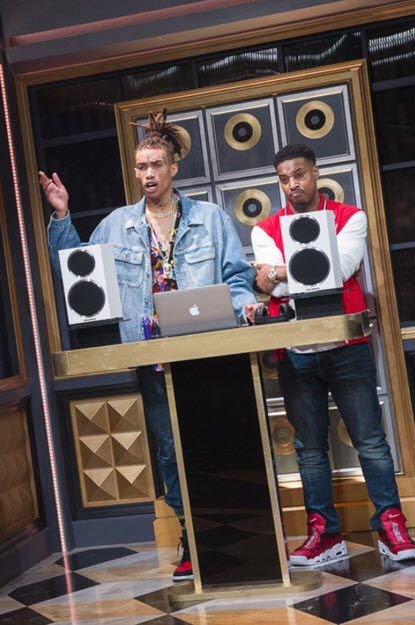 Seth Hill and Gary L. Perkins III in P.Y.G. or the Mis-Edumacation of Dorian Belle. Photo: C. Stanley Photography Photo: C. Stanley Photography When the men finally buy into Dorian’s experiment, Blacky finds he likes all the things he never experienced in the hood and he becomes bros with Dorian, much to Alexand’s dismay. After all their attempts to “mis-edumacate” Dorian, they start to drift into Dorian’s white world. Question: Will Dorian ever truly relate to black culture and the racial injustices that come along with it, or does he just want to appropriate the style and the music to be cool? “You need to sound like the joy and the suffering of slaves,” Blacky tells him in no uncertain terms.
 Gary L. Perkins III and Seth Hill in P.Y.G. or the Mis-Edumacation of Dorian Belle. Photo: C. Stanley Photography Photo: C. Stanley Photography Rap and dance are a big part of this production especially in the explosive scene where the “brothas” demonstrate the hip-hop and breakdancing styles by region from New York to California and Senegal to Zambia. Their dance demos are epic.
Impressive direction from Tearrance Arvelle Chisholm who also wrote last year’s Helen Hayes Award-winning play, Hooded, or Being Black for Dummies. Add to that, super fantastic performances by Seth Hill as Blacky Black, Gary L. Perkins as Alexand Da Great, and Simon Kiser as Dorian Belle.
Assistant director Mari Andrea Travis, fantastic projections by Kelly Colburn, costumes by Danielle Preston, lighting by Jesse Belsky, sets by Richard Oullette, and sound design by original music by composer Gabriel Clausen, make this world premiere play a must-see.
Outrageously funny, insightful and provocative. Highly recommended.
Through April 28th at Studio Theatre – 1501 14th Street, NW, Washington, DC 20005. For tickets and information visit Studio or call 202 232.7267
|

























